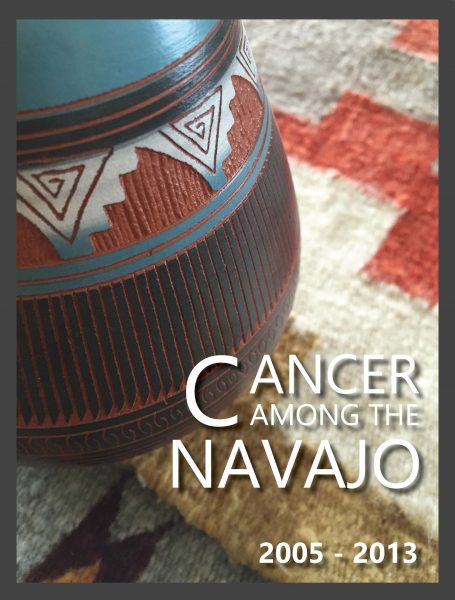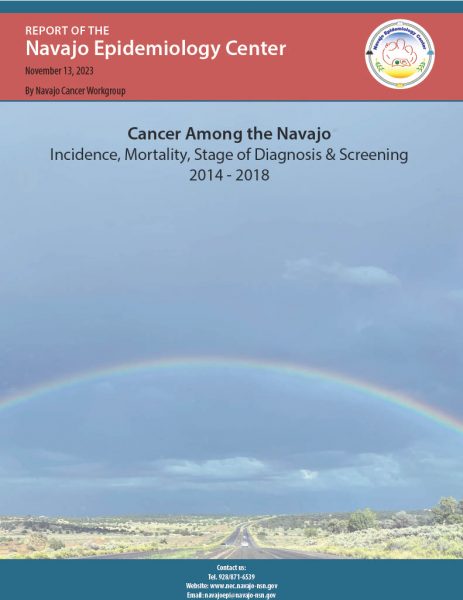C-NACHE project contact
Previous and Recent Navajo Cancer Workgroup reports
Advancing Cancer Health Equity Through Data Innovation – The Navajo Cancer Dashboard
The Navajo Epidemiology Center, in collaboration with partners like Northern Arizona University and the American Cancer Society, has taken a groundbreaking step in addressing cancer health disparities among the Navajo people. On July 24, 2024, the Navajo Cancer Dashboard was launched, providing the first-ever interactive platform developed and led by a tribal entity to visualize cancer data for the Navajo Nation. This tool represents not just a technological achievement but a monumental stride toward empowering communities with knowledge and resources to combat cancer.

The Vision Behind the Dashboard
The Navajo Cancer Dashboard is the brainchild of Del Yazzie, inspired by the public-facing COVID-19 dashboards that became crucial during the pandemic. “Our people were able to see daily case counts, mortality trends, and geographic data,” Del recalls. This sparked a vision: What if the same accessibility could be provided for cancer data? By leveraging the latest in data visualization technology, the dashboard transforms dense cancer reports into a more succinct and interactive format. It offers insights into cancer incidence, trends, stage of diagnosis, and mortality rates among the Navajo for 2014-2018, fostering a deeper understanding of this critical health challenge.
For Del and the Navajo Cancer Workgroup, this project is not just about numbers but about public health action. “Data helps make informed decisions,” Del emphasizes. “Our people may not always understand its full value, but this tool is a step toward changing that.”
Innovation and Collaboration at Its Core
Dr. Dirk de Heer, a Principal Investigator on the project, underscores the collaborative nature of this achievement. The dashboard’s creation involved tribal, academic, state, and federal partners working in unison. From securing data-sharing agreements to managing HIPAA compliance and building the digital infrastructure, every detail required collective effort.
“This is a first,” Dirk states. “The Navajo Nation now has a platform that not only informs its people but also serves as a model for other tribes. With this foundation, we can expand the dashboard to include clinical trial information and beyond.”
Overcoming Challenges and Building Capacity
The journey to launch was not without obstacles. Dashboard Manager Tex Etsitty played a key role in organizing and cleaning the data, working through challenges such as converting cancer registry files and ensuring the dashboard was user-friendly across devices. For Tex, the project marked a learning curve, but it also paved the way for future innovation.
Tex notes, “This was a team effort, but building the capacity to create and maintain these tools is vital. The next step involves developing a data warehouse and expanding our infrastructure to support other dashboards for programs within the Navajo Department of Health.”

Empowering Communities with Knowledge
The impact of the Navajo Cancer Dashboard is already evident. Averaging 60-70 visits per day, users spend 4-5 minutes exploring its interactive features—a testament to its accessibility and relevance. For Graphic Designer Note Louis, this milestone is deeply personal. “I’ve worked on many data-sharing projects, but this one brings the information back to the people it’s about. It’s a huge win for our communities.”
Looking Ahead
The Navajo Cancer Workgroup is determined to build on this momentum. Next steps include finalizing a cancer control plan, publishing findings in peer-reviewed journals, and expanding the dashboard’s scope. The ultimate goal? To use data not just as a reporting tool but as a driver for health equity, ensuring that Navajo families and providers have the knowledge they need to fight cancer effectively.
As Del puts it, “Achievements like this motivate our workgroup and the broader community. It’s a collective effort—and it’s only the beginning.”
This innovation is more than a dashboard; it’s a bridge connecting science, policy, and community. The Navajo Cancer Dashboard is a shining example of how tribal leadership and partnerships can transform data into actionable solutions, making a lasting impact on cancer health equity for Native communities.

